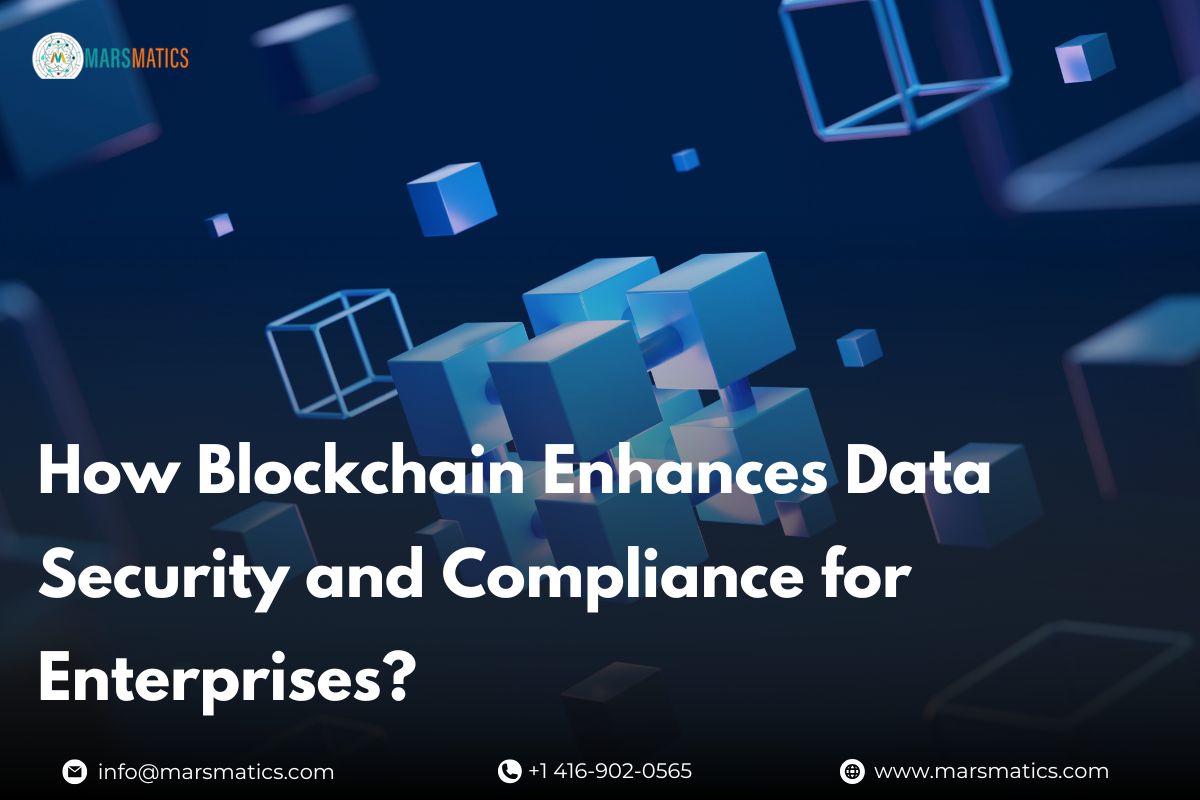How Blockchain Enhances Data Security and Compliance for Enterprises?
Data breaches and regulatory violations are rising concerns for businesses of all sizes. As enterprises collect, store, and process more sensitive data, the need for stronger data protection measures is urgent. One technology standing out in this domain is blockchain. More than just the foundation for cryptocurrencies, blockchain is quietly transforming how businesses secure and manage their data. Let’s explore how blockchain enhances data security and compliance for enterprises.
Understanding Enterprise Data Security Challenges:
The Growing Threat Landscape:
Cyberattacks are growing in sophistication, targeting everything from customer information to intellectual property. Insider threats, accidental data leaks, and ransomware attacks make traditional data systems increasingly vulnerable. At the same time, non-compliance with data regulations like GDPR, HIPAA, or PCI DSS can result in hefty fines and reputational damage.
Why Traditional Security Isn’t Enough:
Most enterprises still rely on centralized databases, which create a single point of failure. If breached, the entire system becomes compromised. Moreover, traditional systems often lack transparency and auditability, making it difficult to track data changes or identify who accessed what and when.
Also Read: Public vs. Private Blockchain Development: Which One Costs More?
How Blockchain Improves Data Security in Enterprises?
Decentralized Data Storage:
Blockchain’s decentralized architecture eliminates the single point of failure. Instead of storing data in one location, it distributes information across a secure network. This structure significantly reduces the risk of widespread data breaches and ensures that data remains accessible even if one node is attacked.
Immutable Ledger Technology:
Once data is written to a blockchain, it cannot be altered or deleted without consensus from the network. This immutability guarantees the integrity of records and provides a trusted source of truth. It also helps prevent unauthorized tampering and fraud.
Encryption & Access Controls:
Blockchain systems use advanced cryptographic methods to secure data. With built-in encryption and role-based access controls via smart contracts, enterprises can manage who accesses specific data and under what conditions. This adds a powerful layer of protection to secure enterprise data systems.
Blockchain data security is not just about preventing breaches—it’s about building trust in how data is handled, stored, and shared within and outside the organization.
Blockchain and Regulatory Compliance:
Real-Time Audit Trails:
Blockchain automatically logs every transaction in a transparent and time-stamped ledger. This makes auditing easier, faster, and more accurate. Regulators can verify data history without the need for manual logs or third-party verification.
GDPR, HIPAA, and Industry Standards:
Blockchain for enterprise compliance supports key global regulations by offering traceability, accountability, and secure data management. In industries like finance, healthcare, and logistics, blockchain facilitates transparent workflows and real-time compliance monitoring. These enterprise blockchain solutions are redefining regulatory alignment.
Also Read: How Blockchain Is Quietly Powering Enterprise Applications in 2026?
Use Cases of Blockchain in Enterprise Compliance and Security
- Financial Services: Detecting and reporting fraud through tamper-proof transaction logs.
- Healthcare: Protecting patient data while maintaining HIPAA compliance.
- Supply Chain: Providing transparent tracking and verifiable product records to meet industry standards.
In all these cases, blockchain cybersecurity plays a vital role in ensuring data integrity, access control, and auditability.
Key Considerations Before Implementing Blockchain for Security:
While blockchain offers significant benefits, enterprises must assess their readiness before adoption:
- Scalability: Can the chosen platform handle your data volume?
- Integration: Will it work with your current systems?
- Cost & Expertise: Do you have the resources and technical skills needed?
- Platform Selection: Options like Hyperledger and Quorum are purpose-built for enterprise blockchain solutions and offer robust features.
Conclusion:
Blockchain is emerging as a cornerstone for secure enterprise data systems. With its ability to decentralize, encrypt, and log data immutably, blockchain data security is redefining how businesses protect sensitive information. Beyond security, it also supports blockchain for enterprise compliance by making it easier to meet regulatory demands.
As cyber threats grow and compliance requirements tighten, now is the time for businesses to consider data protection with blockchain. Investing in enterprise blockchain solutions today means building a smarter, safer, and more transparent tomorrow.
FAQs
How does blockchain improve data security for enterprises?
Blockchain improves security through decentralization, encryption, and immutability. This makes tampering nearly impossible and strengthens the integrity of enterprise data.
Can blockchain help with regulatory compliance?
Yes, blockchain offers real-time audit trails and traceable records that help businesses align with regulations like GDPR, HIPAA, and PCI DSS.
Is blockchain suitable for all types of enterprise data?
Not necessarily. Blockchain works best for high-value, sensitive, or transactional data where transparency and integrity are critical.
What are the risks of using blockchain for data security?
Challenges include scalability, integration complexity, and uncertain regulations in some regions. Choosing the right platform is essential.








